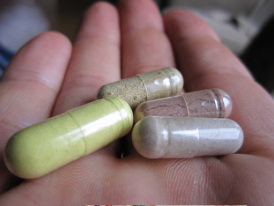|
Part 2 of the supplements series
No. Well, yes. Okay, read on... Everything bodies need nutritionally to maintain adequate health and function can be provided through a proper diet. Protein, healthy fats, fiber, vitamins, anti-oxidants, and minerals are abundant in nature, and without too much effort or expense, adequate nutrition in the United States should be the rule. Sadly, this is not the case. One reason is that our lifestyles have changed in such a way that convenience is often the deciding factor in choosing what, when, and how we eat. Fresh, nutritious foods are generally less convenient and more costly than packaged, processed foods. In 1970, Americans spent about $6 billion on fast food; by 2000, that number grew to more than $110 billion! Americans today spend more money on fast food than they do on higher education, computers, or cars. The problem, as we all know, is that fast food tends to be high in bad stuff like preservatives, additives, flavor enhancers, saturated and trans-fats, sugar, starchy carbohydrates, extreme levels of sodium, and of course calories, while also being notoriously low in the good stuff we need like vitamins, minerals, lean protein, fiber, and healthy fat. It is recommended that adults eat at least 6 servings of fresh fruits and vegetables per day. But do you? On average, Americans eat less than one and a-half servings of fruits and veggies per day with nearly 20% of adults reporting consuming less than one whole serving of fresh fruit per week! Statistics show that nearly half of young adults regularly skip breakfast and about one quarter regularly skip lunch. Skipping meals leads to habitual snacking, and more than half of all Americans eat packaged, processed snack food on a daily basis. Like other fast foods, most snack foods are high in bad stuff and low in the good stuff. Perhaps most alarming is the fact that so-called ‘healthy snacks,’ like granola, energy bars, trail mix, fruit roll-ups, raisins, and ‘power bars,’ are often not much better for you than chips or candy. Marketed as ‘natural’ and ‘health’ foods, these items are generally loaded with sugar and processed with chemicals to keep them from spoiling or clumping. To your body there is little difference between trail mix and a candy bar. Fast food, junk-food snacking, caffeine-laden ‘energy drinks,’ missed meals, and late night eating are all part of our fast-paced American lifestyle and the result is that most Americans are not getting all the nutrients they need from their diet. As if this weren’t enough reason to consider nutritional supplementation, fruits and vegetables are simply not as packed with nutrients as they once were. Many health professionals now believe that the recommendation of 6 servings/day of fresh fruits and/or veggies should be increased to 6-8 servings. Commercial farming practices have led to soil depletion, breeding of crops (and animals) for size and appearance over nutritional value, and the picking of produce long before many of the most important healthful nutrients have been adequately absorbed or developed. In 2004, The Journal of the American College of Nutrition published startling findings which showed that the nutritional value of fruits and vegetables have been steadily declining since 1950.(2) Produce, though bigger and better looking than ever, has less taste and lower nutritional value than it once did. Broccoli in 2004 contained about half the calcium it did in 1950, and that’s just the tip of the nutrient-drain iceberg. Levels of calcium, riboflavin, vitamin C, iron, potassium, and protein in virtually all commercially grown produce have significantly declined, and this report covered only a few common nutrients; potential declines in lesser-known but highly important nutrients like lycopene and zeaxanthin are unknown. The growth of organic farming and the increasing popularity of Farmers Markets which offer foods of higher nutritional value, grown in more nutrient dense soil, and typically allowed more time to ripen on the vine or tree, represent our best attempt to reverse the nutrient drain. Organic and sustainably farmed foods could potentially eliminate the need for supplementation to achieve adequate nutrition. But are you eating 6-8 servings of organic produce each day? And what do we have to do to get better than just “adequate” nutrition? Author: Dr. Gregory Berkoff
2 Comments
8/9/2023 12:39:55 am
Al barakah dates factory - dates juice is made by blending pre-soaked dates with water/milk. Being high in natural sugars, Dates juice is quite sweet in taste.
Reply
Leave a Reply. |
AuthorArchives
August 2021
Categories
All
|



 RSS Feed
RSS Feed